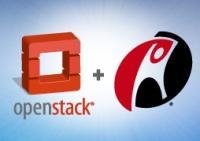Rackspace: OpenStack could be the Linux of the cloud

OpenStack has the potential to become as widely used in cloud computing as Linux in servers, according to Rackspace's chief executive Lanham Napier.

Also, if the open-source cloud operating system is picked up by a mass of businesses across the industry, it could become the Android to the proprietary 'iPhone' clouds sold by Google, Microsoft and VMware, he told ZDNet.
OpenStack, which lets anyone create a private or public cloud service, is backed by an open-source codebase drawing from over a hundred of the technology industry's most important companies. It is already doing better in terms of contributions than Linux was at the same point in its history, according to Napier.
"If we conceive Linux being the majority operating system at server level [with] the LAMP stack, that's the promise OpenStack has," he said. "Rising to meet this threshold is all about a community of usage."
OpenStack is already well on the way to building that community, given the broad adoption the technology has seen since its launch two years ago. At the moment, more than 100 companies have put OpenStack into production, including AT&T, Korea Telecom, the San Diego Supercomputer Centre, HP and the US Department of Energy's Argonne National Laboratory.
This customer list reflects the hunger service providers have for a system that lets them spin up their own brandable public clouds. Doing this helps them in their quest to take developers away from the leader in public cloud, Amazon.
Initial traction
Napier noted that OpenStack has more code contributors than Linux did when it started: it had 206 code contributors by its 84th week, whereas Linux took 615 weeks to get to that level. Similarly, OpenStack had 166 companies adding to it by its 84th week, whereas Linux reached 180 companies by its 828th week.
"The market had a choice," he said. '"The market wanted it, and this is why 160 companies signed up for it. The initial traction is already there."
However, it has not been plain sailing. Citrix, originally an enthusiastic contributor to the project, broke away in April to pursue its own technology, CloudStack. However, Napier believes Citrix left because of the technology it picked up in its acquisition of Cloud.com in July 2011. "They bought it for a whole bunch and they need to use it," he said .
Along with this, two of the biggest players in the cloud — VMware and Amazon — have not participated in the scheme. This is because both companies are committed to their own proprietary cloud infrastructures, with Amazon pouring money into the industry-leading Amazon Web Services cloud and VMware focusing on its virtualisation cloud software.
Towards an open standard
It is still early days for OpenStack, and Napier said the technology will not protect users from the types of failures that have dogged Amazon's cloud.
"The truth is, I think things go wrong in computing and they will continue to," he says. "[But] each new release is more sound and more capable and more resilient."
Ultimately, Rackspace is gambling that if the industry adopts OpenStack broadly, then it will become a standard in its own right. This will bring the same host of "network benefits" that have spurred the rise of Linux, Napier said, noting it would be fair to say that as Canonical is to Ubuntu, Rackspace hopes to become to OpenStack.
"I think the world needs it," Napier said. "The world wants an open standard."